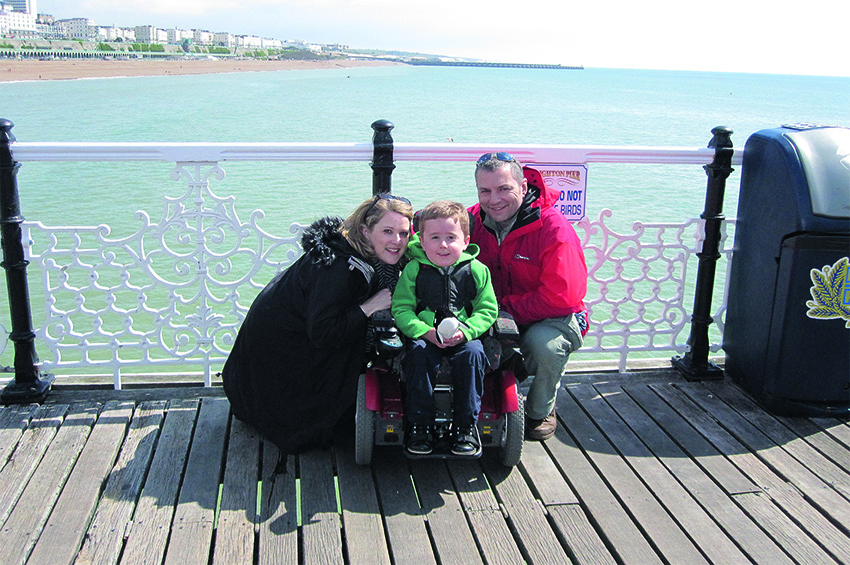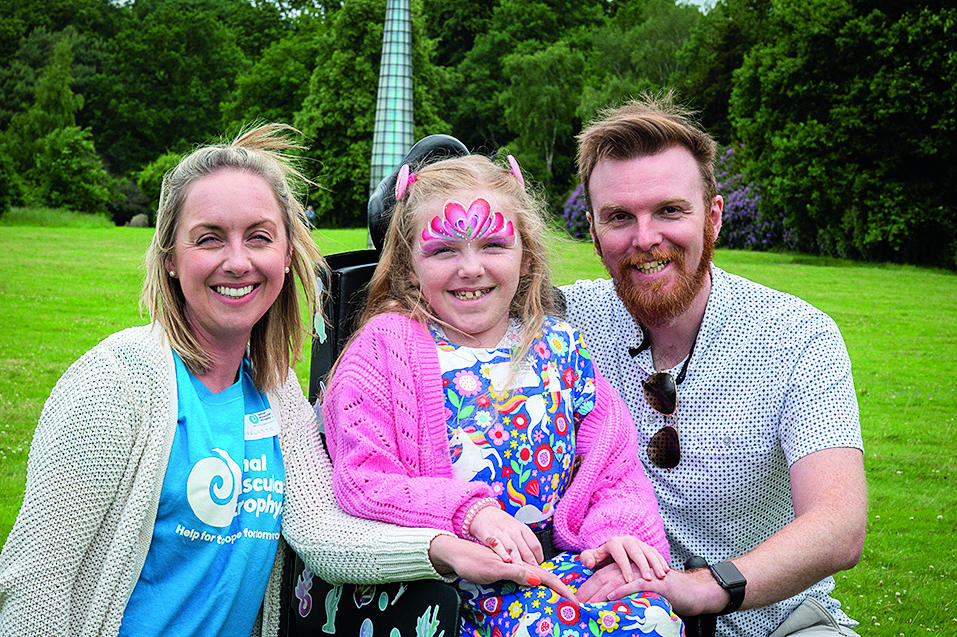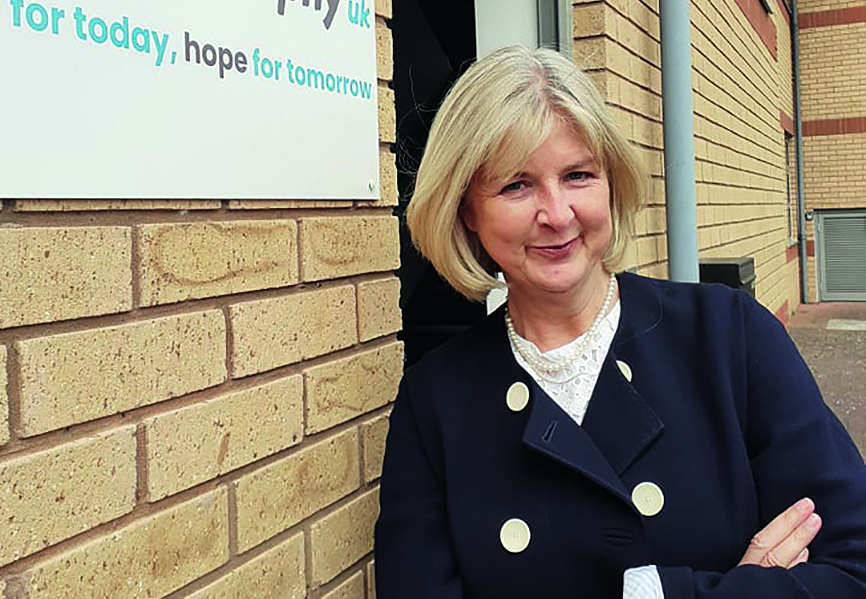Building a brighter future
Yvette Edwards, 51, from London tells us how Spinal Muscular Atrophy UK supported her after her son was diagnosed with the condition

Joseph was around one year old when his parents noticed he wasn’t moving around like other children his age. “We had a group of friends we had met in our antenatal class, and we noticed that while their babies were moving around, crawling and trying to pull themselves up, Joseph wasn’t making any attempts to do these things,” recalls Yvette. “He was just happy sitting in one spot playing with his toys.”
Yvette and her husband took Joseph, now 15, to see their GP, who referred him to a paediatrician. He was then referred on to a neurologist when he was 14 months old. “The neurologist was very experienced and told us straight away she thought Joseph had type 2 spinal muscular atrophy (a genetic neuromuscular disorder that causes progressive muscle degeneration and weakness), which was later confirmed by a blood test “I had done a lot of Googling to try to understand what could be causing Joseph’s symptoms and had come across the condition, but I never really expected that to be the diagnosis and didn’t have a clear idea of what it was or what it meant. It was overwhelming – I felt like our world had been turned upside down.”
As Joseph got older, his condition began to present itself in different ways. “While children with SMA develop emotionally and psychologically like any other child, it has a big impact physically. Joseph has never been able to walk or sit up independently and uses a power wheelchair all the time. As he has weakened muscles, it’s hard for him to do some of the things that we might take for granted, such as pick up a cup and drink from it, so requires one-to-one support at school and help with things like personal care and getting dressed at home.
“He has appointments on average a couple of times a month, as he has to see lots of different consultants, such as a respiratory consultant, a neurologist and a spinal consultant, and he had to have a very big surgery two years ago to fuse his spine. His respiratory system is also compromised, so if he gets a cough or a cold, he needs antibiotics to prevent pneumonia or chest infections.
“Everything requires a lot more thought, as things other people do spontaneously – like jump in the car and go somewhere – have to be planned in advance. We need to know whether there will be wheelchair access, a disabled toilet and space for him to be able to move around, for example, everywhere we go.”
Despite the challenges of living with SMA, Yvette has been amazed at Joseph’s resilience. “At various points, we have had to explain things to him in an age- appropriate way, as there comes a time when they’re little when they realise they can’t walk and other children can, but it’s remarkable how positive and upbeat he has always been and how he takes things in his stride. He has a big appetite for life, is very sociable with lots of friends and has always been focused on the things he can do rather than those he can’t. He has also been massively enabled by all the technology that is now available.
“He loves swimming and is a big fan of gaming, going to the cinema and eating out. He also plays lap steel guitar, suggested by one of his teachers at school, as he wanted to play the electric guitar but didn’t have the strength or dexterity to hold one, so this one lies flat on a table. “My husband and I both felt very strongly from the start that he could and would live a very happy life and have as many opportunities as he could to thrive.”
One thing Joseph is very interested in is SMA research and potential new drug treatments. “For the first time in the last couple of years, there are some treatments around that were never available when he was diagnosed, which is very exciting. Joseph has started one of these treatments in the last few months to help preserve the strength he has.”
Yvette and her family have been kept informed about new treatments and research by the charity Spinal Muscular Atrophy UK, which they heard about from the neurologist shortly after Joseph’s diagnosis. “We were told they would be able to offer some support, of which we definitely felt in need. “We got in touch during the next couple of months and had an outreach worker called Maggie come to visit us at home. She was lovely and spent a lot of time talking us through the things we would need to think about, such as how to make our home wheelchair-friendly and put in place the equipment Joseph needed as he got older.
“She was there to support us with anything we might need and has been alongside our family for around 12 years now, providing advice and support. She helped us when Joseph was going to primary school by writing a letter to explain the condition, and also helped us with contacting the local authority to discuss what his needs would be when he started school. She has worked with many different families and brings a wealth of experience and knowledge, so if something happens we’re not sure about – such as with Joseph’s spinal surgery – she can tell us what other people’s experiences have been, anonymously.
“The charity has also been advocating on behalf of the SMA community for access to new treatments. Joseph is quite keen to see whether something might work for him, so it’s nice to have that hope for the future.” Spinal Muscular Atrophy UK has also put Yvette and her family in touch with other families. “We’ve met some fantastic friends and I’ve learnt so much from them, particularly about how their child manages their care needs in adulthood and how they have been able to build a good life, often with jobs and partners.
“SMA is a relatively rare condition, and when your child is first diagnosed, it can feel overwhelming to try to figure out how you can best support them, so having access to a trusted source of information and support and a community to help you understand what’s possible has been brilliant.
“At the point at which you feel most in need of support to be the best parent you can possibly be for your child, the charity is a one-stop shop of information, support and community. They are an enormously warm and kind team who really care.”
The Candis Big Give
Spinal Muscular Atrophy UK: Supporting people affected by SMA into the 2020s

Total raised: £24,825
Spinal Muscular Atrophy UK provides information, emotional support and practical advice to anyone affected by Spinal Muscular Atrophy, which is a rare, genetic neuromuscular disorder that causes progressive muscle degeneration and weakness, leading to loss of movement.
The money raised in the Candis Big Give will help the charity to continue to deliver a comprehensive package of support to anyone affected by spinal muscular atrophy, empowering the SMA community to manage their condition, choices of support and treatment.
The package of support includes delivering information through podcasts and web updates; signposting to relevant organisations to ensure people have the services, funding and equipment they need; offering emotional and practical support via email, phone or text through its support and outreach service; and putting people in touch with other families to create a network of support from others who care and understand what they are going through.
Due to Covid, the charity was unable to host any face-to-face events in 2020/21, however a return to events in 2022, in the form of five Picnic in the Park events, which took place across the UK during the summer, has been well received by the SMA Community. The charity now plans to build on these events, alongside a programme of virtual events and podcasts to help people stay connected and informed and build valuable relationships.
Visit smauk.org.uk or call 01789 267520 for more information.
What Spinal Muscular Atrophy UK means to me
Angela Smith-Morgan, CEO of Spinal Muscular Atrophy UK, tells us what makes the charity so special

“Spinal Muscular Atrophy UK was set up by the parent of a child with SMA, who tragically passed away at just seven months old. At the time, there was no research into SMA and no organisations to offer support, so the charity was set up to offer hope to other families who were affected.
As a charity, our main aim is making sure we are there for the SMA community and responding to what they need us to do. This could be offering emotional support, providing practical help with things like benefits, or navigating any of the challenges of living with a disability, such as accessing the right equipment, getting the funding they need, or putting people in touch with other individuals or families with SMA to help them build connections. We have also funded research that has helped us to get to where we are today, with new drugs available. These are very exciting times for us and the SMA community, as a couple of new drugs have now been approved for use on the NHS. It also means that people living with SMA have a lot of questions, uncertainty and decisions to make, so we’re seeing so much demand for our support services at this time. I think people get huge emotional benefits from using our support services, from knowing they’re not alone and there are people here who are experts in their field and whose entire job it is to be there for them. That’s the most rewarding thing for me, making a difference every day to people living with SMA and being an impartial, friendly and non-judgemental safe space for people to come, no matter what they are going through.”

Leave a Reply
Please login or register to leave a comment.